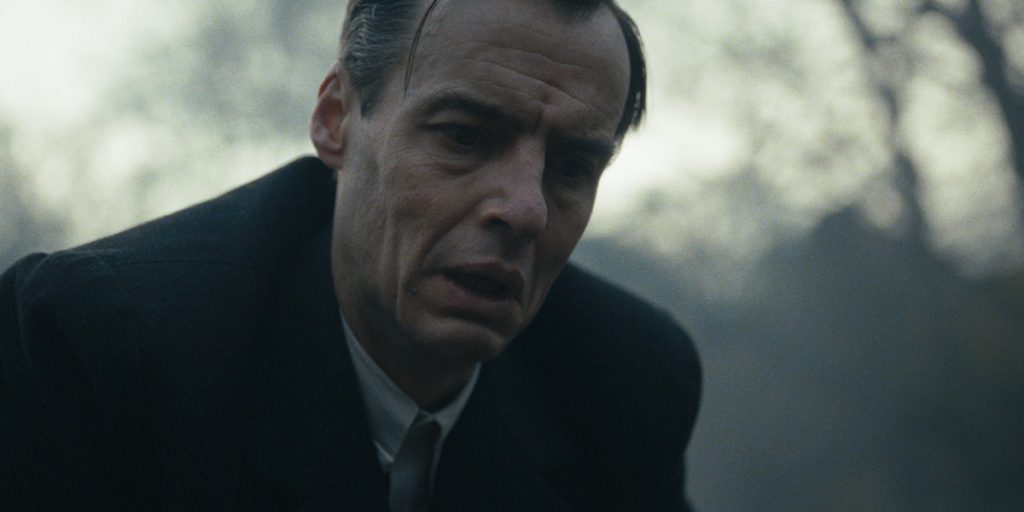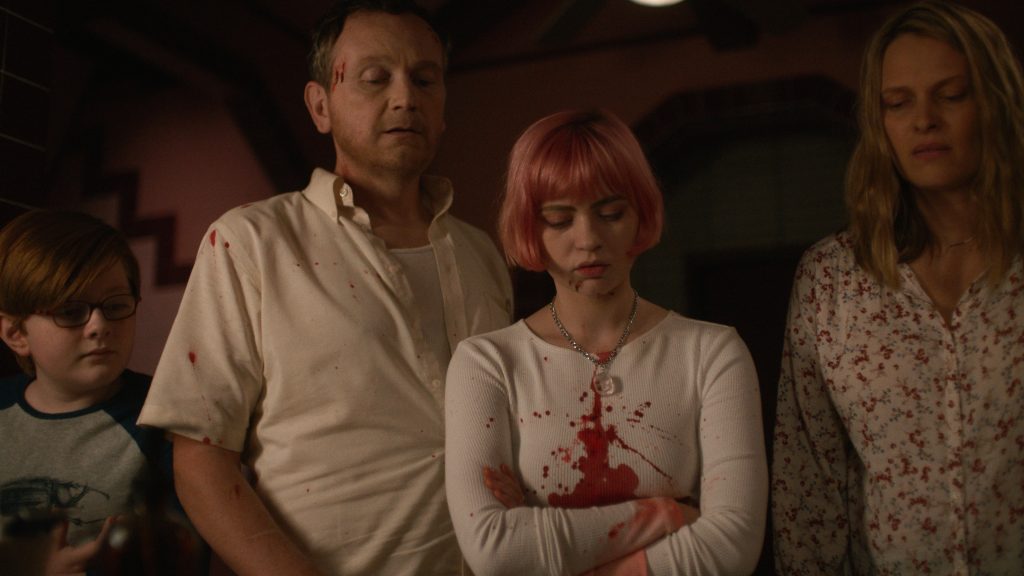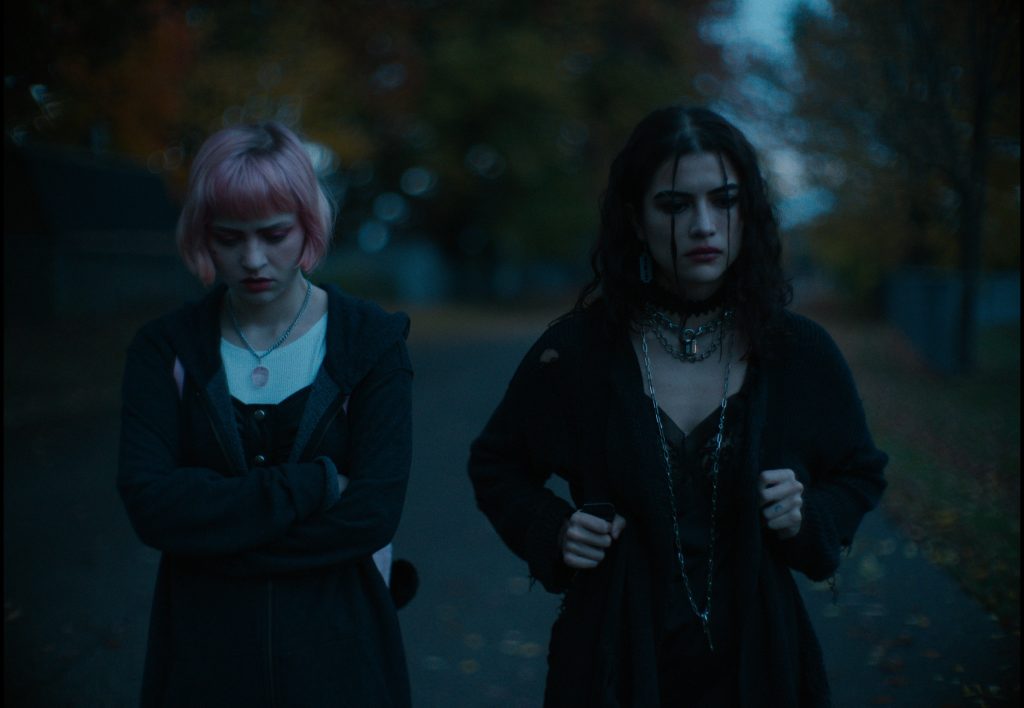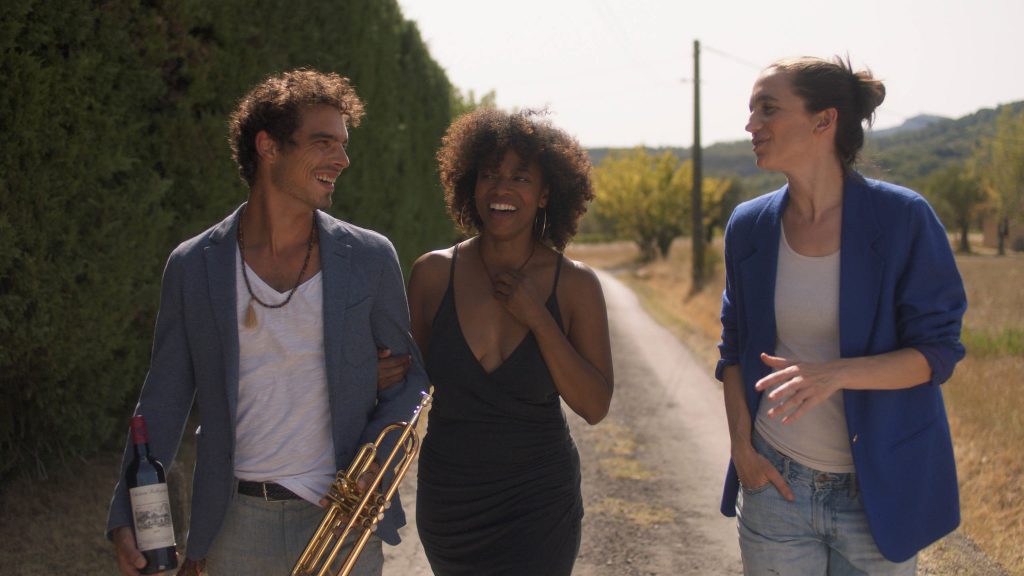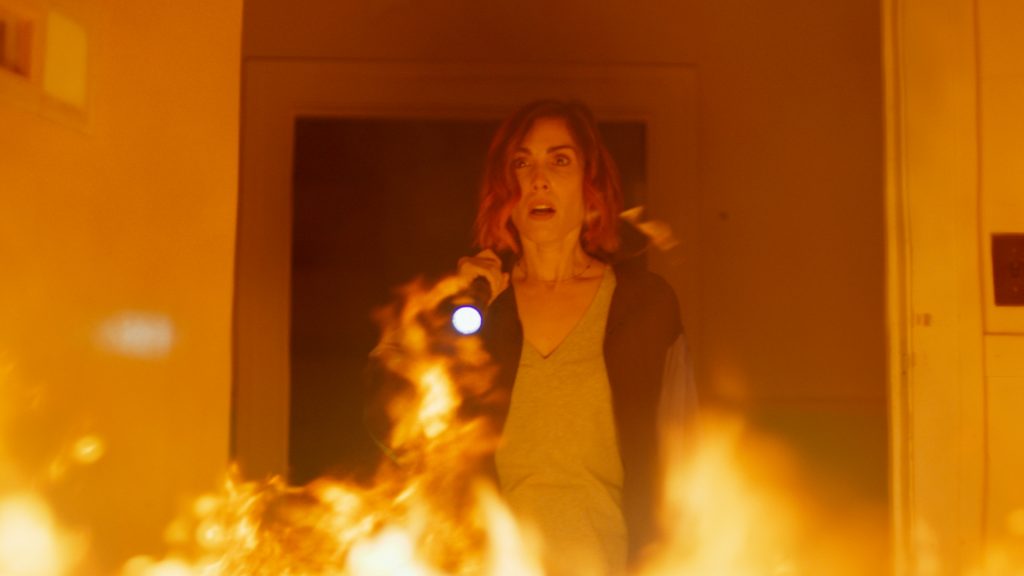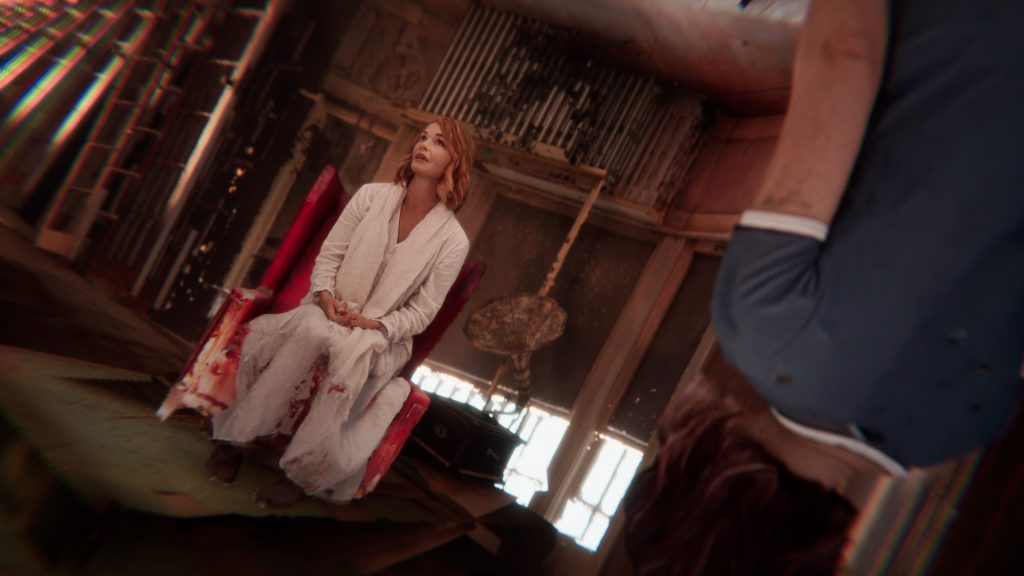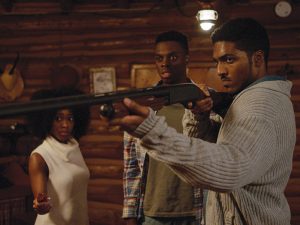September 14, 2021
by Carla Hay
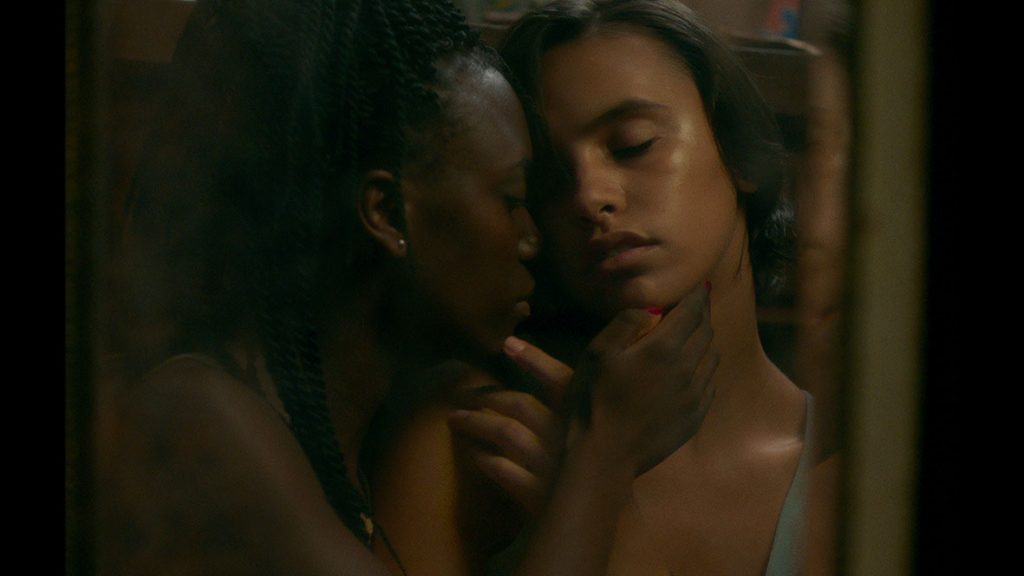
Directed by Agustina San Martín
Spanish and Portuguese with subtitles
Culture Representation: Taking place in Argentina, the dramatic film “To Kill the Beast” features an all-Latino cast of characters representing the working-class and middle-class.
Culture Clash: A 17-year-old girl travels from Buenos Aires to a small town near the Argentina/Brazil border, where the townspeople are living in fear of a mysterious and dangerous beast.
Culture Audience: “To Kill the Beast” will appeal primarily to people who are fans of Gothic atmospheric movies that are more about creating moods and having symbolic storytelling rather than a straightforward plot.
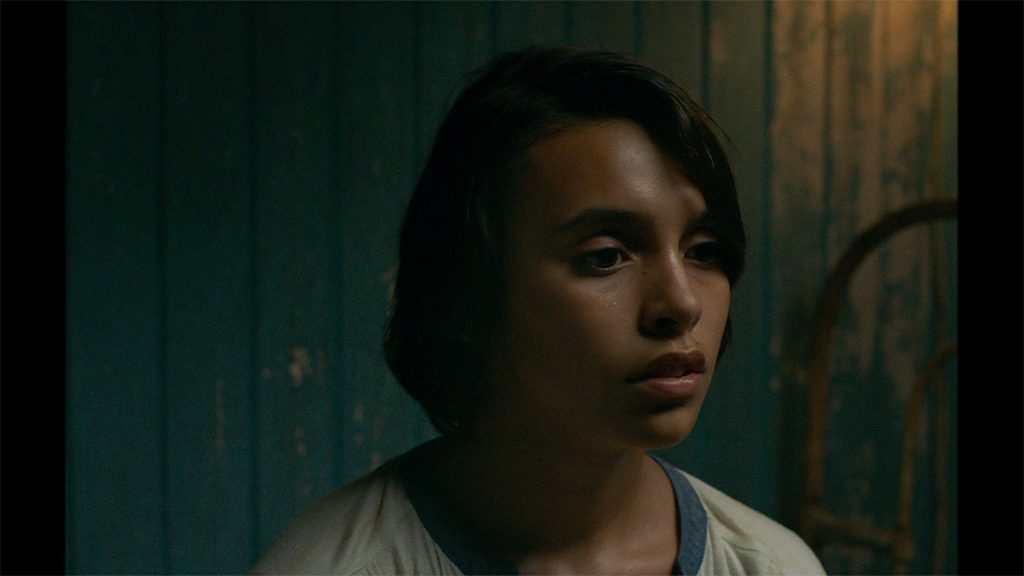
Before watching “To Kill the Beast,” it helps to know that the movie puts a lot more emphasis on symbolism than on literal meanings. The story features a small Argentinian community that is in fear of a treacherous beast. But over time, viewers will see that this beast represents certain prejudices that oppress people in society. “To Kill the Beast” had its world premiere at the 2021 Toronto International Film Festival.
There’s a mystery at the center of the story, but it’s not about where this destructive creature came from or if it will be caught. Therefore, don’t expect “To Kill the Beast” to literally be centered on the townspeople going on a hunt to find the beast, although there is a search party that is shown in the movie. Viewers who are interested in abstract cinema can appreciate the “slow burn” atmospheric storytelling of “To Kill the Beast,” which is about the female protagonist’s journey of discovering her sexuality and other aspects of her identity.
“To Kill the Beast” is the feature-film debut of writer/director Agustina San Martín, who went on location in northern Argentina (near the Brazilian border) to film the movie. The story’s main character is 17-year-old Emilia Otero (played by Tamara Rocca), who has traveled from the capital city of Buenos Aires to a small, fairly remote, unnamed town. Emilia will be staying with her Aunt Inés (played by Ana Brun), who runs a small hostel out of her home. Emilia’s parents are not seen or mentioned in the movie.
Throughout the movie, Emilia repeatedly calls her older brother Mateo, because she expects that he will evenutally meet up with her at their aunt’s place. However, every time she calls Mateo at his home phone number, he isn’t there and she keeps getting his voice mail, where she leaves messages asking him to call her back. Viewers will have to assume that Mateo doesn’t have a mobile phone, because almost every time Emilia calls Mateo, the camera shows his empty house where Emilia’s calls go unanswered on a landline phone.
There are obvious signs that Mateo hasn’t been at his home in several days. On a table is a bowl of fruit that has gone rotten, with insects starting to gather around the fruit. Delivered mail is discarded outside the front door, indicating that no one has been there to pick up the mail. A German Shepherd in the house looks lonely and confused. The dog eventually is able to get through an unlocked door, possibly to look for food and whoever owns the dog.
Emilia isn’t very comfortable staying in this small town because she’s used to the hustle and bustle of a big city. It’s unclear how long Emilia plans to stay, but it’s long enough where she wants to find a job in the area. However, Inés tells her some bad news: She doesn’t have work for Emilia at the hostel. Emilia begs Inés to find some work for her to do: “I’ll do anything you ask,” Emilia pleads.
Inés eventually relents and says that in exchange for the free room and board, Emilia can do odd jobs (mostly cleaning) for the hostel. Inés also instructs Emilia on two rules that she insists cannot be broken: (1) Emilia cannot speak to a guest unless Emilia is spoken to by the guest first and (2) Emilia cannot knock on a guest’s room door to disturb a guest. As soon as Inés tells Emilia these rules, you just know that they’re going to be broken.
Emilia likes to go out to nightclubs and is active on social media. And so, she’s extremely disappointed when her aunt tells her that in this house, there’s no cell phone reception, the radio works poorly, and the television might get just one channel. Emilia also finds out that the town has been gripped with fear of a mysterious beast that roams at night. Women and girls are especially warned that they shouldn’t be outside alone during the nighttime.
There’s a search party of some local townspeople (mostly men and a few women) who have flashlights and guns when looking for the beast in the nearby woods. Inés is so frightened, she doesn’t even want to be near people who are in the search party, out of fear that they might get a spell put on them by the beast. Inés orders Emilia: “If you see anyone getting close to the jungle, don’t let them in.”
Not long after arriving in town, Emilia sees a man standing outside a storage area. His name is Lautero (played by João Miguel), and Emilia asks him if he’s seen Mateo. “Are you from the news?” Lautero asks suspiciously. Just then, a young missionary wearing a priest’s collar approaches. but Lautero wants to avoid him and quickly goes into the warehouse. When Emilia asks the clergyman if he’s seen Mateo, he just stares at her and says nothing before walking away.
Emilia eventually meets some people who are close to her age. One of the young women tells her, “They say a beast appeared in town, a week ago already. that he’s been wandering around that land. Some say it is the spirit of an evil man. Everyone’s talking about it, that it turns into different animals.”
Emilia asks, “And what does it do to you?” The woman replies, “The worst. I think you should be careful.” Meanwhile, the leader of the search party bellows things such as: “I don’t want to see any women by themselves!” and “Our daughters are in danger!” Eventually, Emilia becomes paranoid too. At one point, Emilia confesses that she’s “afraid of everything and everyone.”
“To Kill the Beast” has a few flashbacks to Emilia’s life in Buenos Aires. There’s a flashback scene of her hanging out at a nightclub with her unnamed boyfriend (played by Frederico De Elias Bevacqua), but she’s also exchanging lusty glances with a woman at the nightclub. Her boyfriend knows that Emilia is leaving Buenos Aires to live with her aunt, and the flashback scene is on one of the last nights that she spends in Buenos Aires before she leaves.
And what about Emilia’s brother Mateo? It’s hinted that he’s gotten mixed up in something sinister, possibly illegal. Whenever Emilia asks the people in town who know Mateo if they’ve seen him, they usually react with discomfort. There are clues that Mateo has a bad reputation, but what he did or where he is remains a mystery. However, at one point in the story, when Emilia calls Mateo, she gets someone named Jesus (voiced by Ariel Lorenzo) on the phone instead.
While this town has become increasingly panic-stricken over the beast, a new guest arrives at the hostel. Her name is Julieth (played by Julieth Micotta), and she’s in her early-to-mid 20s. Julieth is confident and not intimidated by the stories of the beast. Emilia becomes fascinated with Julieth. She secretly spies on Julieth any chance that she gets.
It doesn’t take long for Julieth to notice that Emilia seems to be infatuated with her. And the feeling becomes mutual. When Emilia is with her nightlife peers, she’s openly queer (there’s a scene of her dancing suggestively with another woman), but she’s still “in the closet” to her religious and conservative aunt and other people.
There are also signs that the town uses the fear of the beast as a way to restrict the freedoms of the town’s female residents. You don’t have to be a genius to figure out that the beast is really a manifestation of fear that can lead to oppression. The biggest clue is the comment about how the beast can take many forms.
People should not expect an action-packed thriller in “To Kill the Beast” because it’s more of an introspective story about how living in this repressed and apprehensive town affects Emilia. In Buenos Aires, she was free to openly be who she is. In this small town, she has to confront her fear of being shamed, ridiculed or shunned if she chooses to not hide her true identity. And because she’s frequently cut off from cell phone and Internet service, Emilia can’t get the social media validation that she’s used to getting on a regular basis.
All of the cast members of “To Kill the Beast” are convincing in their roles, with Rocca carrying the movie’s tone with a realistic portrayal of someone who is both rebellious and terrified of society’s pressures. With this movie, San Martín meticulously presents a teenager who has to confront her fear of not just rejection from the outside world but also fear of accepting herself. Although this story is centered on a young person in Argentina, it effectively speaks to universal and timeless truths of humanity.




